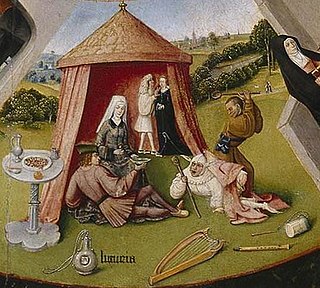
Original sin, also called ancestral sin, is a Christian belief in the state of sin in which humanity has existed since the fall of man, stemming from Adam and Eve's rebellion in Eden, namely the sin of disobedience in consuming the forbidden fruit from the tree of the knowledge of good and evil. This condition has been characterized in many ways, ranging from something as insignificant as a slight deficiency, or a tendency toward sin yet without collective guilt, referred to as a "sin nature", to something as drastic as total depravity or automatic guilt of all humans through collective guilt.

The seven deadly sins, also known as the capital vices or cardinal sins, is a grouping and classification of vices within Christian teachings. Behaviours or habits are classified under this category if they directly give birth to other immoralities. According to the standard list, they are pride, greed, lust, envy, gluttony, wrath and sloth, which are also contrary to the seven virtues. These sins are often thought to be abuses or excessive versions of one's natural faculties or passions.

Lust is a psychological force producing intense wanting or longing for an object, or circumstance fulfilling the emotion. Lust can take any form such as the lust for sexuality, love, money or power. It can take such mundane forms as the lust for food as distinct from the need for food.

Vice is a practice, behaviour, or habit generally considered immoral, sinful, criminal, rude, taboo, depraved, or degrading in the associated society. In more minor usage, vice can refer to a fault, a negative character trait, a defect, an infirmity, or a bad or unhealthy habit. Vices are usually associated with a transgression in a person's character or temperament rather than their morality. Synonyms for vice include fault, sin, depravity, iniquity, wickedness, and corruption.
Repentance is the activity of reviewing one's actions and feeling contrition or regret for past wrongs, which is accompanied by commitment to change for the better. Today, it is generally seen as involving a commitment to personal change and the resolve to live a more responsible and humane life. In other words, being sorry for one's misdeeds. But it can also involve sorrow over a specific sin or series of sins that an individual feels he or she has committed. The practice of repentance plays an important role in the soteriological doctrines of Judaism, Christianity, and Islam. Analogous practices have been found in other world religions as well. In religious contexts, it often involves an act of confession to God or to a spiritual elder. This confession might include an admission of guilt, a promise or intent not to repeat the offense, an attempt to make restitution for the wrong, or in some way reverse the harmful effects of the wrong where possible. As such it can be seen as being similar to therapeutic practices though it clearly differs in its particulars.

Confession, in many religions, is the acknowledgment of one's sins (sinfulness) or wrongs.

Penance is repentance of sins as well as an alternate name for the Catholic, Eastern Orthodox, and Oriental Orthodox sacrament of Reconciliation or Confession. It also plays a part in confession among Anglicans and Methodists, in which it is a rite, as well as among other Protestants. The word penance derives from Old French and Latin paenitentia, both of which derive from the same root meaning repentance, the desire to be forgiven. Penance and repentance, similar in their derivation and original sense, have come to symbolize conflicting views of the essence of repentance, arising from the controversy as to the respective merits of "faith" and "good works". Word derivations occur in many languages.
An Act of contrition is a Christian prayer genre that expresses sorrow for sins. It may be used in a liturgical service or be used privately, especially in connection with an examination of conscience. Special formulae for acts of contrition are in use in the Anglican, Catholic, Lutheran, Methodist and Reformed Churches.
According to Roman Catholicism, a venial sin is a lesser sin that does not result in a complete separation from God and eternal damnation in Hell as an unrepented mortal sin would. A venial sin consists in acting as one should not, without the actual incompatibility with the state of grace that a mortal sin implies; they do not break one's friendship with God, but injure it.

A mortal sin, in Catholic theology, is a gravely sinful act, which can lead to damnation if a person does not repent of the sin before death. A sin is considered to be "mortal" when its quality is such that it leads to a separation of that person from God's saving grace. This type of sin should be distinguished from a venial sin that simply leads to a weakening of a person's relationship with God. Despite its gravity, a person can repent of having committed a mortal sin. Such repentance is the primary requisite for forgiveness and absolution. Teaching on absolution from serious sins has varied somewhat throughout history. The current Catholic teaching was formalized at the 16th century Council of Trent.

In electronics, a mixer, or frequency mixer, is a nonlinear electrical circuit that creates new frequencies from two signals applied to it. In its most common application, two signals are applied to a mixer, and it produces new signals at the sum and difference of the original frequencies. Other frequency components may also be produced in a practical frequency mixer.

The fall of man, or the fall, is a term used in Christianity to describe the transition of the first man and woman from a state of innocent obedience to God to a state of guilty disobedience. Although not named in the Bible, the doctrine of the fall comes from a biblical interpretation of Genesis chapter 3. At first, Adam and Eve lived with God in the Garden of Eden, but the serpent tempted them into eating the fruit from the tree of knowledge of good and evil, which God had forbidden. After doing so, they became ashamed of their nakedness and God expelled them from the Garden to prevent them from eating from the tree of life and becoming immortal.
Hamartiology, a branch of Christian theology, is the study of sin.

In Christian theology, contrition or contriteness is repentance for sins one has committed. The remorseful person is said to be contrite.

In Roman Catholicism and Lutheranism, the Penitential Rite, also known as Confession and Absolution, is a form of general confession that takes place at the start of each Divine Service or Mass.
The Sacrament of Penance and Reconciliation is one of the seven sacraments of the Catholic Church, in which the faithful obtain absolution for the sins committed against God and neighbour and are reconciled with the community of the Church. By this sacrament Catholics believe they are freed from sins committed after baptism. The sacrament of Penance is considered the normal way to be absolved from mortal sin, by which one would otherwise possibly condemn oneself to Hell. Catholic theology regarding the forgiveness of sins debates whether Christ at the judgment of the individual after their death would allow those with unconfessed mortal sins a chance to repent and save themselves – especially those who had not made plans to confess, or were not mentally ill, coerced, or suicidal. While persons with certain unconfessed mortal sins that were under some form of censure still at their death might not be allowed a Catholic Funeral Mass and burial rites, and while Catholics with unconfessed mortal sins may not receive Communion, these matters, though related, are not the same as whether an individual with unconfessed serious sins is condemned to Hell.

The doctrine of sin is central to Christianity, since its basic message is about redemption in Christ. Christian hamartiology describes sin as an act of offence against God by despising his persons and Christian biblical law, and by injuring others. In Christian views it is an evil human act, which violates the rational nature of man as well as God's nature and his eternal law. According to the classical definition of St. Augustine of Hippo sin is "a word, deed, or desire in opposition to the eternal law of God."
Reconciliatio et paenitentia is an apostolic exhortation by Pope John Paul II, delivered on 2 December 1984 in Saint Peter's Basilica in Rome, which grew out of the Sixth General Assembly of the Synod of Bishops held in 1983. The third of John Paul II's apostolic exhortations, it presents Jesus as the Reconciler of a shattered world.











